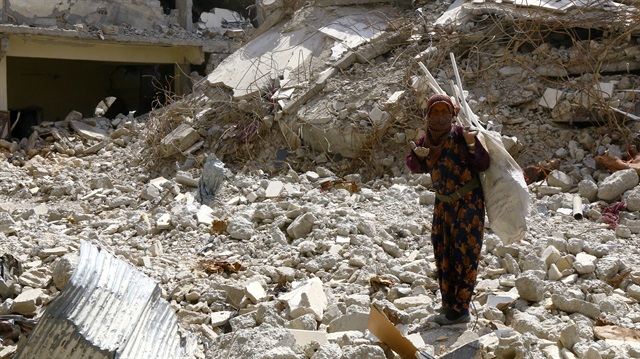
U.S.-led air strikes destroyed much of Syria's Raqqa while crushing Daesh last year, but the coalition has done little to help it recover, rights group Amnesty International said on Friday.
Nearly a year after the battle, 80 percent of the city is in ruins and thousands of bodies lie in the rubble, with funding to recover them poised to run out, said Anya Neistat, Amnesty's senior director of global research.
"It's absolutely shocking in Raqqa how little over this last year has actually been done to bring life back to the city," she said at a news conference in Beirut after visiting Raqqa.
"The coalition, given that they have the money to carry out this very, very expensive military campaign, should have enough money to work with its consequences," she added.
Daesh made it hard to take the city without killing civilians, blending in with the local population and using car bombs as they retreated from street to street.
By the time the campaign ended, entire districts lay in ruins, Reuters reporters covering the battle said.
"30,000 houses in Raqqa have been completely destroyed and 25,000 are partially destroyed," said Neistat.
So far about 2,500 bodies have been dug from the rubble.
"To the extent that they are able to identify the bodies, they believe that the majority of them are civilians. And the majority of these civilians have died as a result of coalition air strikes," she said.
"Nobody knows what's going to happen to the 3,000 bodies that still lie in the ground come 31 October when the funding for this team runs out," she said.
The coalition says it works on stabilisation in Raqqa, not reconstruction.
"The number's around 3 million people liberated, which is a good thing. There was a lot of damage. I don't think the problem lies with coalition countries not wanting to help," said Colonel Sean Ryan, the coalition spokesman.
He pointed to coalition countries not being able to work with the Damascus government, which opposes their presence, as an obstacle to channelling help.
Amnesty in June said coalition strikes may have broken international law, which it denied. The coalition says it worked hard to avoid deaths and is transparent in its efforts to investigate.
People in Raqqa said their main priority was education after suffering years of Daesh rule, but the few schools that had reopened were heavily overcrowded and riddled with war damage, Neistat said.





